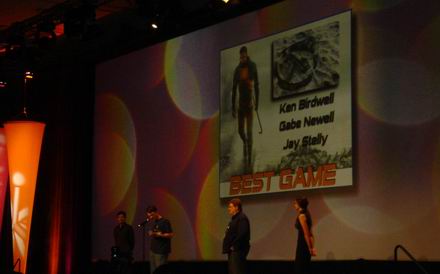The night started by announcing the 12 winners of the Independent Games Festival, featuring some of the year's best games created by independent developers. In the "web/downloadable games" category, the big winner was Wik and the Fable of Souls, an "action-fable" created by Reflexive Entertainment, winning three of the six awards given to web games, including the grand prize. In the "open" category, the big winners were Alien Hominid (which also won three awards), and grand prize winner Gish. The most memorable moment of the IGF awards, however, came during the grand prize speech, when one of the developers used the moment as a stage for a marriage proposal (thankfully, she said yes).
In terms of awards, this year's Game Developers Choice winners didn't stray far from the games that have topped most other lists: Half-Life 2, Halo 2, World of Warcraft and continual crowd favorite Katamari Damacy. Of that group, Half-Life 2 was the only multiple winner of the night, taking home four of the five awards it was up for. Accepting the award for Excellence in Writing, Valve's Marc Laidlaw noted that the reaction people have had to Half-Life 2's story and characters isn't necessarily an indication of how far games have come over the years, but "how much of a thirst there was for (story) in the first place." Also taking home an award was Crytek, taking rookie-of-the-year honors for Far Cry.

Members of Valve Software accept the award for Best Game of 2004.
In addition to the traditional awards, a Lifetime Achievement award was given to Eugene P. Jarvis, the programmer responsible for arcade classics such as Defender, Stargate, Robotron and Smash TV. The year's "First Penguin" award (named for the souls willing to test uncharted waters) went to Richard Bartle, who co-wrote the first MUD in 1978. Other awards were given to Sheri Grener Ray for her work championing women game developers, and the Maverick Award to UK developers Blast Theory for their work mixing performance art with games and mobile technology.
As has been the case with many of the previous Game Developers Choice awards, the tone of the evening was fairly laid-back and focused on the developers and the awards, eschewing trappings such as celebrity presenters and cheesy skits that have hurt other shows. In fact, the low point of the show was the only skit attempted: a poorly conceived, poorly executed "Career Eye for the Game Guy" makeover-type segment that was managed to bring the show to a halt (and was greeted with near dead-silence) with all three installments. Other than that, the Game Developers Choice Awards retained its status as the most solid of the various videogame award shows -- click to the next page for the full list of award winners.


